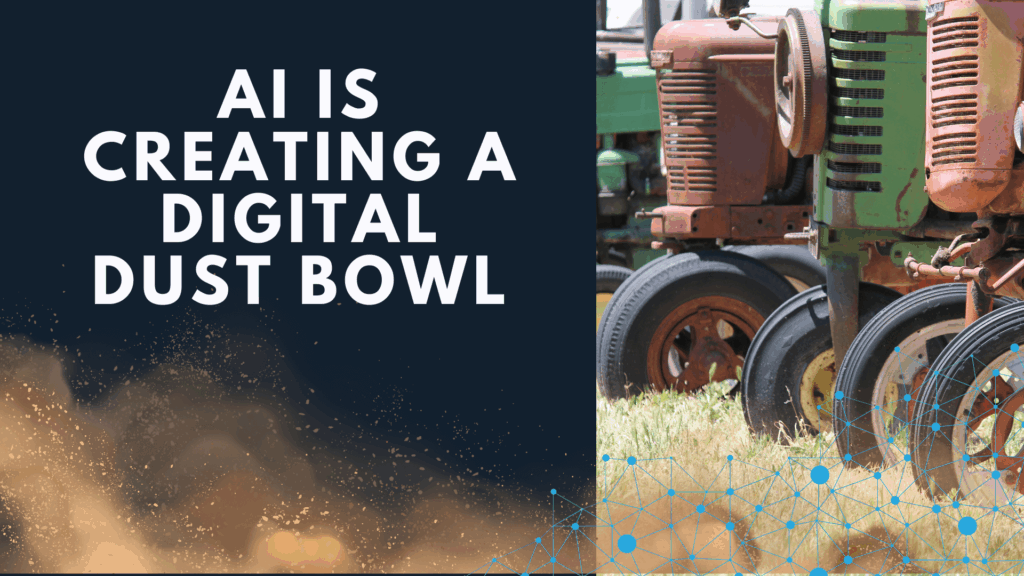In the 1920s and 1930s, America experienced a massive change in agriculture and farming in the United States. The introduction of tractors and large-scale farming machinery completely changed farming, agriculture and a variety of industries. Farmers could produce more food in a shorter amount of time with less manpower. While these farming advances were great, there are sever consequences that resulted from overproduction, poor soil management, and unsustainable farming practices. This led to the 1930s Dust Bowl. From this point forward farming forever changed.
Today, we’re experiencing a digital version of that same crisis.
We are in the midst of a Digital Dust Bowl, an age of overproduction brought on by artificial intelligence. AI doesn’t save time; it increases output. It floods the market with content, apps, and solutions. Just like in the 1920s, we’re seeing advancements that unlock new levels of productivity. But we’re also beginning to see the cracks in the system.
The Cost of AI Overproduction
AI tools like ChatGPT, Grok, Jasper, and others are reshaping the content marketing landscape, and the software landscape. They make it easy to produce blog posts, podcasts, software, applications and videos at an astonishing rate, but all of this production will likely come at a cost.
The internet has become saturated with articles that say the same thing, rehashed in different words. Blogs that used to feel personal and insightful now read like regurgitated Wikipedia pages. Podcast descriptions, SEO pages, even software code is merely a template. As production increases quality and standards decrease. This leads to:
- Degradation Of Language
- Focus on production rather than helping consumers.
- Lower quality standards.
This is the Dust Bowl of the digital age. We’re plowing the digital soil without thinking about the long-term effects. We’re prioritizing scale over substance. And in doing so, we’re degrading the quality of the web and online experience as a whole. If online spaces become so overrun with bots and inhuman experience, it will destroy the very purpose the world wide web came into existence for in the first place, for human connection and communication.
SEO in the Dust Bowl Era
As a digital marketer who works online and in Search Engine Optimization marketing every day, I’ve watched search results decline in quality. Google is a librarian, trying to find the best answer to your question. But when the library is flooded with books that say the same thing, just written by different machines, it becomes harder to find anything worth reading.
AI-generated content is cheap and easy, and businesses chasing fast growth are publishing thousands of pages without stopping to ask: is this actually helping someone? Over the past three years, we have seen businesses and search engines alike compromise on quality in the name of profit.
The irony of the situation is the businesses that succeed long-term will not be the ones that produce the most. They will be the ones who produce the highest quality content.
With AI, History Is Likely To Repeat Itself
In the Great Depression, government intervention created farming standards, which was needed. But in doing so, many farms began producing to the minimum quality required. That lowered the bar. We’re already seeing parallels with AI-generated content.
There are still successful small farms today, but rather than focusing solely on production, they focus on quality. The ones that focus on organic food, in-person experiences, and personalized service stand out. They charge more, serve fewer, and yet thrive. Why? Because they offer something different.
I predict the future of the internet will be less about being found, yes, there will be a huge section and “farm” side of the internet, but the other use will be more focused on specific experiences, interactions, and relationships.
The Survival Strategy for Creators and Agencies
So how do we survive this Digital Dust Bowl?
- Quality > Quantity: It sounds obvious, but it’s radical in an age of automation. Put in the time to craft content that’s truly useful.
- Be Present: AI can mimic thought, but it is not you. Your experience, your voice, your story is what makes content online valuable.
- Offer a Unique Experience: Whether it’s a service, a newsletter, or a blog, make it personal. Make it real.
- Think Long-Term: If you’re playing the short game, go ahead and flood the internet. But if you want to build a sustainable business, invest in meaningful content, branding, and strategy.
Just like some farms survived by returning to basics, so will marketers, developers, and creators who create something valuable online.
What’s Ahead: A Great Depression of the Internet?
We’re heading into a moment where people will either disengage or double down. I see it already, friends, family, even clients split into two camps. Many people are logging off more and more. Why? Because people are not getting from social media or websites what they used to.
While I work in digital marketing, I believe it is good that people are pulling away from the internet, seeking real interaction, real people, and real experiences. Website and the web are a useful tool for information. As meaning is lost online, it can be found in person, in reality.
AIs Are The Tractors Of The Digital Age
AI is not inherently bad, it is a tool. Tractors weren’t bad either. The problem comes when we use powerful tools without wisdom. The best businesses in the AI age won’t be the ones who use it for everything. They’ll be the ones who understand what AI should and shouldn’t be used for.
If you’re in marketing, software, coaching, or content, don’t get swept away by the AI churn. Slow down. Think. Create something worth reading, worth watching, worth listening to.
Considering Trying To Rank In AI Results?
If you want your business to rank in AI, consider investing in GEO or Generative Engine Optimization. Our digital marketing is focused on helping your business grow.

